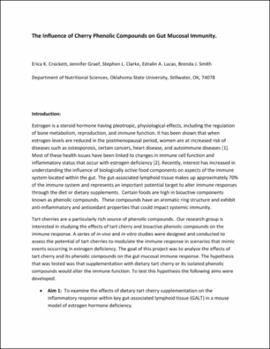| dc.description.abstract | Postmenopausal women experience increased incidence of osteoporosis and autoimmune diseases due to changes in immune function. Fruits such as tart cherry that are rich in polyphenolic (PP) compounds can alter the gut mucosal immune response and induce a physiological change. Our purpose was to examine the effects tart cherry has on gut mucosal immunity. We developed two specific aims to address this study; Aim 1: Examined the effects of dietary tart cherry on the inflammatory response within a key gut-associated lymphoid tissue (GALT) in an estrogen deficient mouse model and Aim 2: Examined how tart cherry polyphenolics affect inflammatory status of epithelial cells. Aim 1 used an in-vivo model with ovarian hormone deficient mice. Five-month-old female C57BL/6 mice (n=10/group) were either sham-operated (Sham) or ovariectomized (OVX) and assigned to a treatment group consisting of control (AIN-93M) or control diet supplemented with 5% tart cherry powder. At the end of the 28-day treatment period, Peyer's Patches from the small intestine were isolated and total RNA extracted. RT-PCR was performed to assess the relative abundance of key genes of interest. A key gene involved in t-cell differentiation, Transforming growth factor (TGF)-B, was up-regulated by OVX and this response was partly suppressed with cherry supplementation. The gene expression of interleukin (IL)-10 and signal transducer and activator of transcription (STAT)-3 were not significantly altered by OVX compared to the Sham group; however, cherry supplementation up-regulated the relative abundance of both of these genes. Aim 2 used an in-vitro model utilizing Caco-2 (ATCC), gut epithelial cells under inflammatory conditions (1ug/ml LPS) and tart cherry PP extract at doses of 0, 2.5, 5, and 10 ug/ml. After 24 hours of treatment, RNA was extracted, cDNA synthesized, and qRT-PCR performed. Phenolic compounds at all doses down-regulated IL-1B, a pro-inflammatory cytokine, in the LPS-treated Caco-2 cells. Conversely, the anti-inflammatory cytokine, IL-10 abundance was low for all treatments and was not altered by LPS or any of the doses of PP. Both pro- and anti-inflammatory cytokine, IL-6 expression was suppressed with LPS. The highest dose of the PP extract (10 ug/mL) further reduced the relative abundance of IL-6 in Caco-2 cells under inflammatory conditions. Our findings demonstrate that OVX produced a pro-inflammatory environment in the GALT, a response that may have implications to osteoporosis and autoimmune disease risk for women after menopause. We also found that supplementing the diet with tart cherries had a positive effect on these OVX-induced changes by: down-regulating the pro-inflammatory response; up-regulating the anti-inflammatory response; and potentially altering T-cell differentiation in the gut. The in-vitro findings suggest that the PP compounds in tart cherry are at least, in part, responsible for this response. | |
